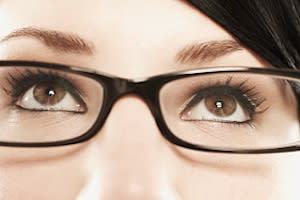Busting eyeglasses myths for better vision

By Sarah B. Weir
According to the Vision Council of America, there are about 12 million adults in the United States with an uncorrected vision problem. We investigated 4 common glasses myths to help you save money and take care of your eyes.
Wearing prescription glasses makes your vision worse
Fiction. Some people are reluctant to increase the power of their prescription eyeglasses and contact lenses or even rely on glasses at all because they fear it will weaken their eyesight over the long run. It turns out this is a myth that was perpetuated in the 1920s by an eye doctor named William Horatio Bates in order to promote his system of exercises called the "Bates Training Method to Sight Without Glasses."
There is no proven benefit to doing eye exercises or using a lower prescription. The American Academy of Ophthalmology explains that the degeneration of vision is generally caused by hereditary factors or age. So, if you think your glasses are making your eyes worse because you periodically need a stronger prescription, in fact your eyesight is just naturally becoming weaker. See your eye doctor.
Over the counter reading glasses can harm your eyes
Fiction. Like gray hair and a slowing metabolism, needing to use reading glasses is one of the unwelcome signs of middle age. After about age forty, the lens of the eye becomes more rigid which makes it harder to focus on close objects. This condition is called Presbyopia. Most drugstores nowadays carry readers. The American Academy of Ophthalmology says that over the counter reading glasses are perfectly safe if you don't need corrective lenses for distance. For the best results, the Mayo Clinic recommends that you try on different powers (labeled 1.0 for weakest to 4.0 for strongest) while reading something held at a distance of 14-16 inches.
All sunglasses protect your eyes
Fiction. All sunglasses filter light, but they don't necessarily protect from the sun's harmful rays. When you purchase sunglasses, look for a label that says they block 99-100% of UV-A and UV-B rays. The label UV 400 also means they block 100% of UV rays. According to the organization Prevent Blindness America, long-term exposure to UV rays can lead to cancer, macular degeneration, and cataracts. If you aren't sure if your favorite sunglasses are UV protective, an optometrist can easily check them.
Expensive eyeglasses are better quality than cheap ones
Depends. The mark-up on eyeglass frames in enormous-especially for plastic designer frames where you are paying mainly for the name. However, Lee Duffner, Professor of Ophthalmology at the University of Miami School of Medicine, explains that paying more for lightweight, sturdy materials such as titanium can be worth the added cost. Higher quality lenses made of polycarbonate will also increase the price of your prescription glasses package, but if you wear your glasses all the time it might be the best option-polycarbonate is stronger, lighter, and transmits more colors than the most common and cheapest material, CR-39 plastic.
Eyeglasses have improved the quality of life of millions and millions of people. As Duffner says, "Put on your glasses. There is a beautiful world out there waiting to be seen"
